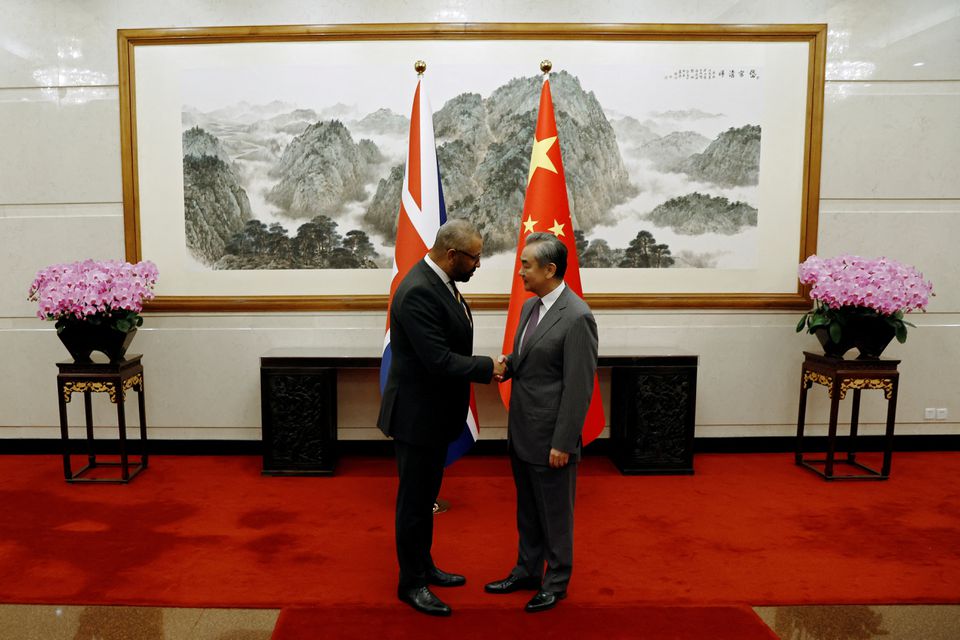UK Prime Minister Rishi Sunak and his foreign secretary James Cleverley accused of negligence following a Sunday Times exclusive alleging the arrest of a Chinese government spy working in parliament had been known since March.
Two men have been arrested alleged of spying for the Chinese government. One of the men, a British national said to be in his late twenties, worked as a parliamentary researcher and is believed to have had access to influential Conservative figures, including the security minister Tom Tugendhat and Foreign Affairs Committee chairwoman Alicia Kearns.
Both China and the accused deny the accusations, describing them as ‘groundless’.
Information surrounding the arrests is said to have been known since March despite the governments recent efforts to stabilize diplomatic relations with China, prompting accusations of negligence by the government.
News of the alleged spy has re-ignited criticism from traditional China hawks in the Conservative party, most notably former Prime Minister Liz Truss and former leader Sir Iain Duncan Smith, who have long charged the UK response to the China threat is insufficient.
Below, we explore what the fall-out of a spy in parliament might mean for the government and its recent efforts to reset Sino-UK relations.
Arrest of alleged spy complicates the PMs efforts to reset Sino-UK relations
The PM and his government had hoped to reset Sino-UK relations, which were at a historic low point, with disputes over Hong Kong, Huawei’s role in UK 5G networks, and criticism of Beijing’s treatment of its ethnic Uyghur population just a handful of diplomatic fall-outs in recent years. The foreign secretaries recent visit to Beijing had made him the first senior UK official to visit China in 5 years.

News of the alleged spy complicates efforts to stabilize relations, with the Times reporting Sunak faces a split in his Cabinet with compromised security minister Tom Tugendhat and home secretary Suella Braverman said to support a tougher stance on China.
Former PM and ex-Tory leader, Liz Truss and Sir Iain Duncan Smith, are leading figures in advocating a tougher stance on China. Duncan Smith summarized their wish for parliament to take a binary approach to China, ‘are they a threat or not?’ he asked the Commons.
Earlier this year, parliament’s intelligence and security committee report on China concluded a lack of action by successive UK governments to the threat of China constituted a ‘serious failure’ to protect UK national security.
Government’s failure to heed their warning may have prompted China sceptics to take action. Let us dissect why.
Timing is good politics
Publicizing the arrests of Chinese government spies at a time when efforts to repair Sino-UK relations are underway is unlikely to be a coincidence. It creates rifts in government and demands a degree of distancing in the UK-China relationship.
The timing of a press release in September surrounding arrests made in March is suspicious. News of the alleged spy in parliament broke as the PM attended this years G20 summit in Delhi.
The foreign secretary had alluded to the PMs desire to speak with Chinese officials directly at the G20 which prompted backlash from the aforementioned Tory MPs. Whether these MPs took unilateral action to prevent a reset of Sino-UK relations is speculation but nonetheless, the timing is interesting.
Or perhaps Downing Street took the decision to leak the information, calculating it could re-engage with China whilst demonstrating its ability to criticize the Chinese government to party sceptics.
Another possible angle is Downing Street sought to demonstrate to China UK ability to wield soft power and damage China’s international reputation.
Might the foreign secretary have heard something in his visit to Beijing that suggested it no longer respected the notion that the UK has leverage to lean on? If China’s media spokesman Victor Gao’s interview with Andrew Marr on LBC is anything to go by, this wouldn’t be surprising.

Ultimately, this is but speculation and it is unlikely we will ever know the truth. What we do know is that espionage is nothing new. Its publicization is a political choice. This choice needn’t come at the expense of efforts to stabilize the Sino-UK relationship, as we detail below.
The UK has a responsibility to engage with China
As the foreign secretary succinctly put it when outlining the UKs China strategy earlier this year, ‘shirking the responsibility to engage with China is a sign not of strength, but of weakness’ and one which ultimately hinders the national interest.
The success of China in infiltrating UK parliamentary democracy rightly warrants scrutiny of existing national security measures, yet it needn’t come at the expense of efforts to stabilize the bilateral relationship.
Rather than secede to Sinophobia which damages UK national interests in the long-run, the government should continue efforts to repair Sino-UK relations.
International relations is not a black or white subject. It isn’t a question of whether one likes nor agrees with individual leaders or political parties, it is a question of substance in how diplomatic relations facilitate safer and more prosperous societies around the world.
Contrary to popular belief, this is a view shared by the head of Britain’s secret service, Richard Moore, who argues it is ‘absolutely necessary to engage with China. For the simple reason that not a single international problem of any importance can be addressed if we do not’.


